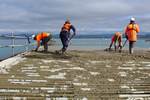Pultron Composites GFRP rebar addresses facility, marina project challenges
The company’s Mateenbar GFRP rebar has led to more durable solutions for production of a new medical research center, and to improve structures regularly exposed to harsh marine conditions.
Reinforced concrete foundations laid for the M─ütai facility. Source (All Images) | Pultron Composites
Pultron Composites (Gisborne, New Zealand) recently highlighted two successful construction projects involving the use of high-performance glass fiber-reinforced polymer (GFRP) rebar, including development of the Matai Medical Research Institute and construction of a reinforced concrete breakwater for the Tauranga Bridge Marina.
Construction of the M─ütai Medical Research Institute was contracted by Dawson Building Co. in 2022. The facility, dedicated to medical innovation in New Zealand, involved integration of Mateenbar into the facility’s concrete slab.
“Mateenbar was used as an alternative to steel to form two layers of mesh in a 300-millimeter-thick monolithic slab,” says Pete Gourlay, Dawson Building project manager. “We found that the light weight and long lengths were a real game-changer. Lifting was very easy and long lengths resulted in labor savings. We would not hesitate to use this product again.”
The institute’s home, completed as Stage 1 of a broader medical campus, was officially opened in 2023. Planning is well underway for Stages 2 and 3, which aim to be delivered over the next 3 years.
Tauranga Bridge Marina project.
Tauranga Bridge Marina, a 2024-2025 project designed and contracted by Bellingham Marine, required a reinforced concrete breakwater to safeguard yachts and powerboats from storm events and harsh marine conditions. The structural integrity and longevity of the breakwater were paramount to ensure the marina’s long-term protection and functionality.
Traditional steel reinforcement posed several challenges for this project, particularly in a harsh saltwater environment where corrosion is a major concern. Conventional steel-reinforced panels are susceptible to rust, which can compromise structural integrity over time, leading to costly maintenance and repairs. Additionally, the weight of steel reinforcement significantly impacts handling, transportation and installation costs.
Recognizing these challenges, Bellingham Marine, selected Mateenbar GFRP rebar to reinforce the concrete panels of the breakwater wall. This decision provided multiple advantages over conventional steel reinforcement. It reduced each panel’s weight by 2 tonnes and ensures a 100-plus year asset life, in addition to saving on handling, installation and long-term maintenance costs.
Mateenbar has been demonstrated in many other projects, including a giant statute in the UAE and the Jizan flood channel project.
Related Content
-
Rock Fiber Inc., ReforceTech form ReforceTech Americas
Joint venture entity will drive the availability and applicability of fiber reinforcement in construction to clients worldwide.
-
ExxonMobil announces licensing agreement to expand GFRP rebar processing tech
ExxonMobil acquires exclusive overseas licensing rights for Neuvokas’ proprietary manufacturing process, expanding to global markets.
-
Fiber Elements raises €2.6 million seed funding for 3D basalt fiber
The company’s approach combines FEA with advanced manufacturing processes to create mineral composites that are 3X stronger than steel while weighing two-thirds less, aiming to replace steel reinforcement in construction.






